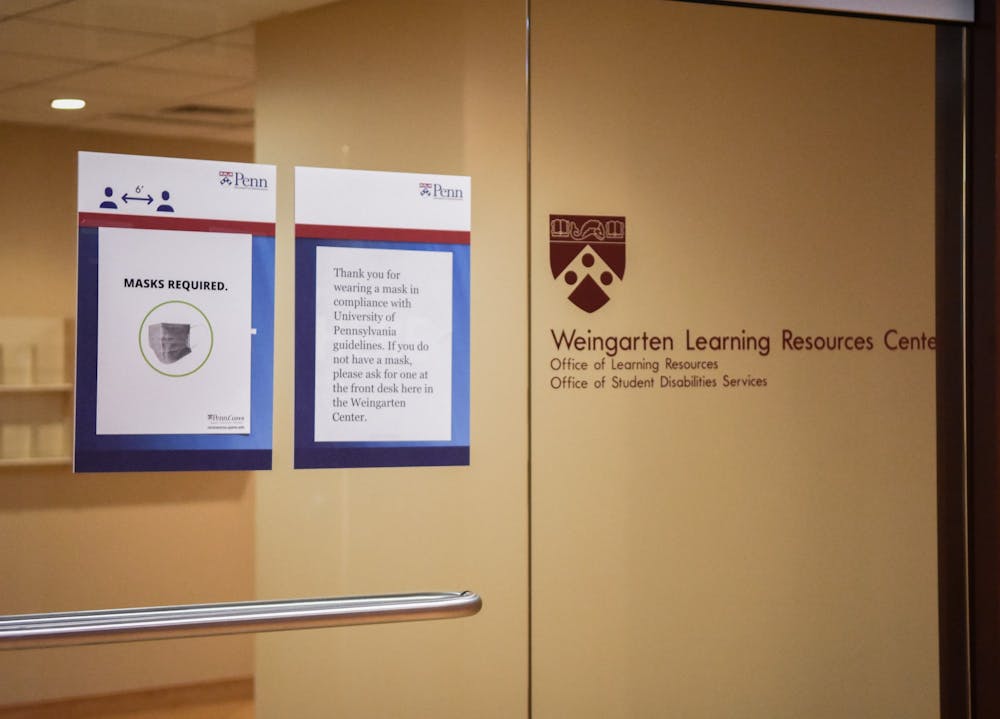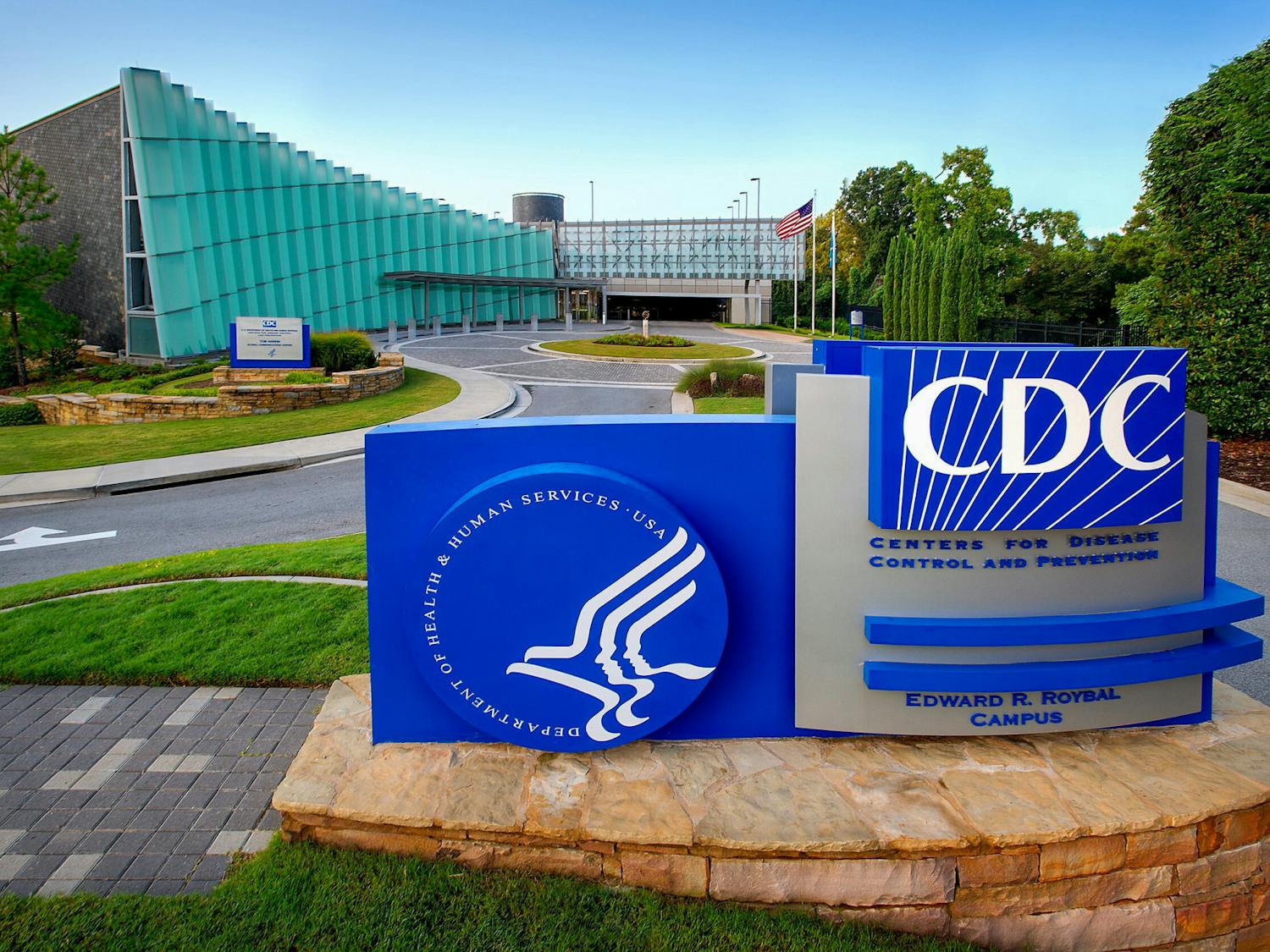Penn students reported difficulties in receiving testing accommodations during the first several weeks of the semester when the Biotech Commons — which houses Disability Services' testing center — was closed for construction.
Exams for students with assessment-related accommodations were relocated to different campus buildings until the center reopened in early October, which frustrated students who said they did not receive proper accommodations at these locations and had to familiarize themselves with each building's accessibility features.
“We understand that it was not ideal," Director of Disability Services at the Weingarten Center Aaron Spector said. "I think [the renovations] created some confusion from day to day in terms of exam administration and it created some more work for staff as well."
Disability Services partnered with Biotech Commons to use the reading room on the library’s blue level as a distraction-reduced testing environment, Spector said. During ongoing renovations of the library, the University registrar worked with Disability Services to find alternate testing locations for students with accommodations. More than 800 exams were scheduled in the first six weeks of the fall semester through Disability Services, Spector said.
College sophomore Ellie McKeown took a relocated exam for BIOL 251: Molecular and Cellular Neurobiology in the Jaffe History of Art Building, but said she experienced noise and spacing issues in the testing room.
McKeown is approved to take assessments in quiet, private testing spaces, as well as to receive 50% extended time and typing ability for handwritten exams. In the Jaffe Building, however, she said her exam environment was neither quiet nor isolated. The exam took place in a small classroom with several other students, and noise from an active construction site adjacent to the building was disruptive during the assessment.
“It literally got to the point where I had to accommodate my own self, and just get out my noise-canceling headphones,” McKeown said. “I shouldn't have to resort to accommodating myself through any means possible because I know a lot of other kids can’t afford to do that like I can, or don’t have a disability that is as dynamic as mine.”
Another one of McKeown's exams for BIOL 205: Cell Biology took place in the Weingarten Center, which she praised for providing a quieter, cubicle-style testing environment. She encountered difficulties, though, as she was not provided a computer for her typing accommodation. Forced to handwrite her exam, she had to put on arthritis gloves to cope with the pain from her hand cramps..
Penn students start club to strengthen sense of community among students with disabilities
Students with disabilities face challenges accessing campus buildings
Like McKeown, students have also encountered issues with receiving their approved accommodations in the alternate testing locations.
A College junior, who requested anonymity for fear of retaliation from Disability Services, was not given a laptop for her relocated CRIM 100: Criminology exam, despite needing a typing accommodation and contacting Disability Services in advance. She had to handwrite her exam until a staff member from the Weingarten Center brought a computer to the testing site.
“It was just really, really frustrating because I [could] literally feel my learning disability affecting me as I was taking this exam because they didn’t have the proper materials for me,” the College junior said.
The College junior, however, said that her typed responses to the exam were lost and could not be delivered to her professor because the printer in her relocated testing site was down. While she was told that her exam would be printed and delivered in another building, her professor never received her answers. She added that her professor was understanding of the situation and assured her that her grade would not be negatively impacted.
The computer issues the College junior faced are not a problem in the Biotech Commons testing center, as the room is equipped with two desktop computers with assistive technology as well as a Closed Circuit Television for magnification accommodations, Spector said.
College junior Ishani Mehta, who is approved for 50% extended time on assessments and a distraction-reduced testing environment, faced a large obstacle when she arrived at Weingarten, her alternate testing center, and learned the proctor did not have her exam.
After about an hour of troubleshooting, a supervisor from the Weingarten Center came to the testing site and brought Mehta to his office, where she took the assessment.
“If it really is supposed to be making life easier, there shouldn't be so many hoops we have to jump through on our end,” Mehta said.
The College junior also criticized the onus placed on students to ensure they receive their approved accommodations.
“The specific department at Penn that is there to help students with their academic concerns and their academic needs is making my academic life so much harder,” the College junior said. “Now that I have the accommodations, it’s up to me to deal with everything, which doesn't feel very accommodating.”
The renovations in Biotech Commons also made it so that testing locations for accommodated exams change frequently, often the day before an assessment.
McKeown, who is physically disabled, found this particularly frustrating. She had to familiarize herself with the accessibility features of each building every time her testing location changed before her assessment.
She also noted that she had trouble communicating with Disability Services, after several of her emails were left unanswered or requests for meetings pushed off until after fall break.
“My disability doesn’t go away outside of normal business hours,” McKeown said. “I don’t want to have to wait a week, two weeks, a month to be able to schedule a meeting with you to be able to receive the accommodations that I require in the first place.”
Other students similarly felt that Disability Services should have been more communicative about the testing center's closure.
The College junior learned of the closure when the portal for scheduling accommodated exams asked her to choose a location for her assessment, as opposed to it just taking place in Biotech Commons as it had in previous semesters.
“I feel like I never got an email or anything saying, ‘Hey, the testing center is closed. Here’s what's going on,’” she said. “I felt like I was kind of in the dark.”
Spector said some communication delays from Disability Services are due to the increased workload the Biotech Commons' renovation placed on its staff. He encouraged students to place their accommodated exam requests a week or more in advance so that all arrangements can be properly made in a timely manner.
Now that Biotech Commons is open, the vast majority of accommodated exams take place at the testing center, Spector said.
Mehta praised the usual exam environment that Disability Services utilizes in Biotech Commons. She said that having all of the necessary materials for accommodated exams in one location made taking assessments easier, and added that the Biotech Commons "had a flow and rhythm about it."
Connection to AirPennNet is currently weak in the Biotech Commons room, Spector said, meaning that some exams on Canvas proctored by Disability Services continue to be administered at various locations around campus.
In other scenarios where Biotech Commons is not an appropriate exam environment, such as when a student receives accommodations that are incompatible with the library testing center, exams are also scheduled in different locations on a case-by-case basis.
McKeown, who has a breathing disorder and allergic disorder, faced this challenge when taking an exam for GEOL 100: Intro to Geology in Biotech Commons. The testing center was dusty and full of allergens, she said, and by the time her assessment began, she was in tears and her throat had swelled up. The desks inside of the testing room also had fan vents overhead, which were another irritant to McKeown during her exam.
After repeated correspondence with Disability Services over email, McKeown said Disability Services took a health team to Biotech Commons and sanitized it, getting rid of dust and allergens. The desks in the testing center have also been moved slightly off of the wall to avoid drafts from the vents, she said.
McKeown urged Disability Services to consider building accessibility from the perspective of individuals with disabilities, though she understands systemic inequalities and underfunding also contribute to some of the problems they are facing. Students with physical disabilities also reported earlier this year that they faced long-standing challenges in accessing campus buildings.
“What’s happening right now is that a lot of able-bodied people and neurotypical people are going around accessing these buildings and saying it’s up to code for them,” McKeown said. “[But the buildings are] not necessarily up to code for the community that they’re serving.”









